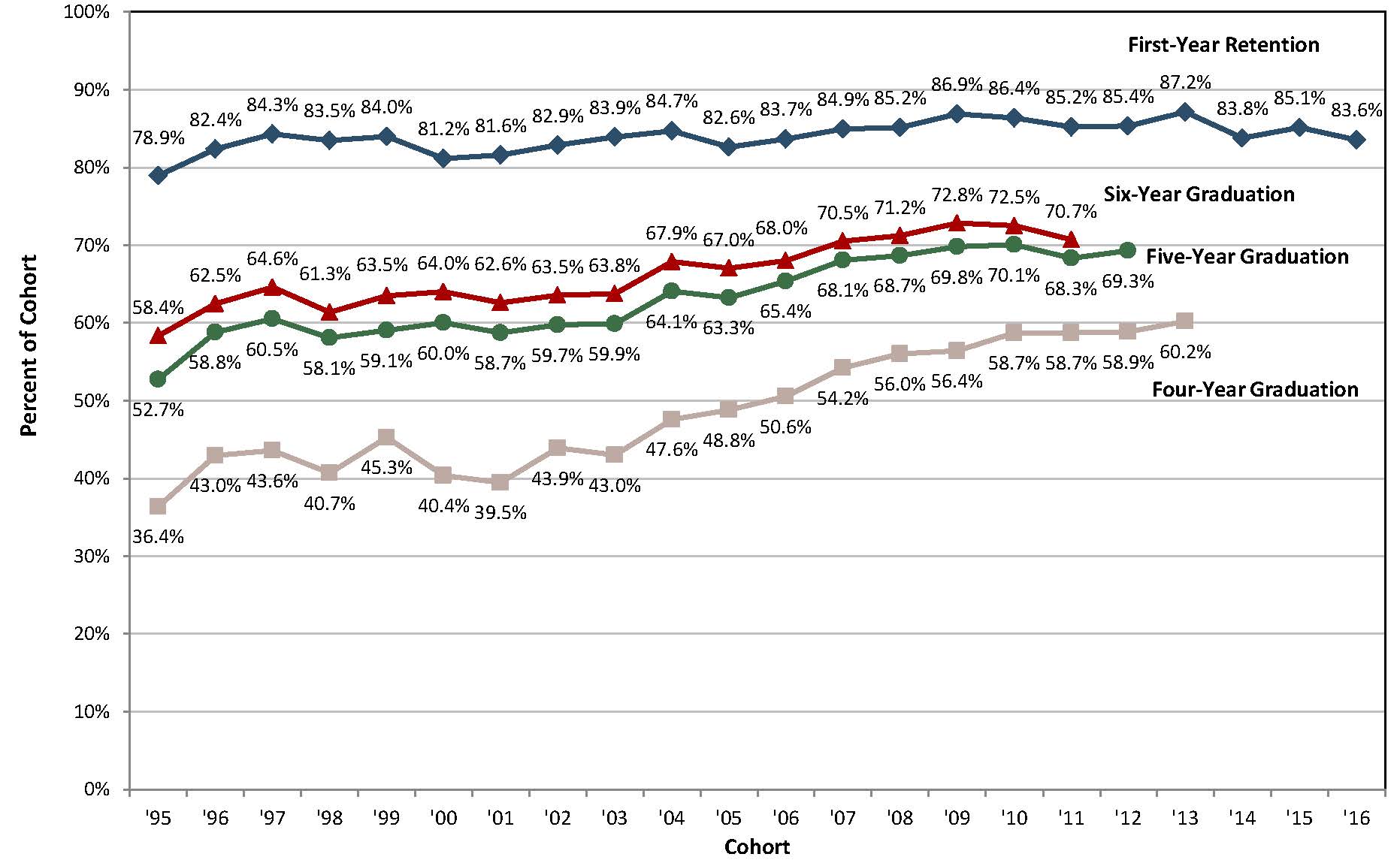 First-Year Retention, Four-, Five- and Six-Year Graduation Rates, 1995-2016
First-Year Retention, Four-, Five- and Six-Year Graduation Rates, 1995-2016A university record 60.2 percent of freshman who enrolled at DePaul in fall 2013 graduated in four years, according to the recently released “
Trends in Freshman Retention and Graduation” report prepared by EMM’s Institutional Research and Market Analytics (IRMA). This most recent four-year graduation rate is 1.3 percentage points higher than the previous best, and marks the 10th straight year the rate has increased.
“We should all be proud of this accomplishment,” says David Kalsbeek, senior vice president of Enrollment Management and Marketing. “It is a reflection of both the quality of instruction students receive in the classroom and the support they receive outside it. As a university, we’ve made a concerted commitment to improve student outcomes and that is reflected by this class.”
In addition to the four-year rate,
the report also looks at six-year graduation rates and freshmen retention. It provides analysis based on factors ranging from demographic characteristics to academic preparation before entering DePaul to academic performance during the freshman year.
The six-year graduation rate, which is used for reporting to the federal government, decreased marginally this year. While the 70.7 percent six-year rate is 1.8 percentage points less than last year, it still represents the fourth-highest six-year rate in university history. The freshman retention rate, which tends to show the most variance from year-to-year, ticked down slightly by 1.5 percent to 83.6 percent.
The university continues to outperform four-year private institutions nationally in retention and graduation rates by a significant margin. DePaul exceeds the national average for first-year retention by 9 percentage points, the average four-year graduation rate by 9 percentage points, and the average six-year graduation rate by 12 percentage points.
First-Year Performance is Critical to Retention and Graduation
Students from the fall 2016 freshman class who earned a GPA of 2.5 or better and 48 or more credits, considered high academic performance, returned at a rate of 95 percent this fall. Students who achieved moderate performance (either a 2.5 GPA or 48 credits, but not both) returned at a rate of 88 percent, while only 43 percent of students who failed to reach either benchmark returned for their sophomore year. Sixty-three percent of the 2016 cohort achieved the high-performance threshold while 20 percent were in the low-performance category.
While the difference in retention rates between high and moderate performance is relatively small, it becomes much more dramatic when comparing graduation rates. Seventy-five percent of students from the 2013 class who achieved high performance in their freshman year graduated by June 2017; only 49 percent of students with moderate performance did. Students with low performance faced much longer odds; only 6 percent graduated within four years.
Successful performance has tangible economic benefits for students, explains Kalsbeek.
“There is no question first-year performance is critical to students’ aspirations to graduate in a timely manner. For the cost-conscious student, time to degree is as critical to affordability as tuition price, if not more so. As questions of cost and value have an increasingly central focus in the national discourse on the benefits of higher education, it is important that we do all we can to cultivate high academic performance and progress in the freshman year.”
Retention and Graduation Highlights by Segment
Underlying the overall retention and graduation rates are varying outcomes by subgroups of the student population. Some highlights from
this year’s report include:
- Less prepared freshmen (as determined by a weighted index of multiple factors including high school GPA, test scores and high school quality) graduated at a rate of 60 percent within six years, the same as the national rate for all 4-year private institutions.
- Freshmen who participate in the EDGE Program have a notably higher four-year graduation rate (74.2 percent) and six-year graduation rate (82.1) than freshmen overall.
- The first cohort of Health Science Pathways Program graduated within four years at a rate of 72.9 percent, exceeding the overall freshman cohort by 12.7 percentage points.
DePaul’s Executive Retention Group (XRG) oversees the university’s retention strategy. Data and other information developed for XRG are available on the
Student Retention at DePaul website. For additional questions about DePaul’s retention and graduation rates, contact
Liz Holder, senior research associate for IRMA.